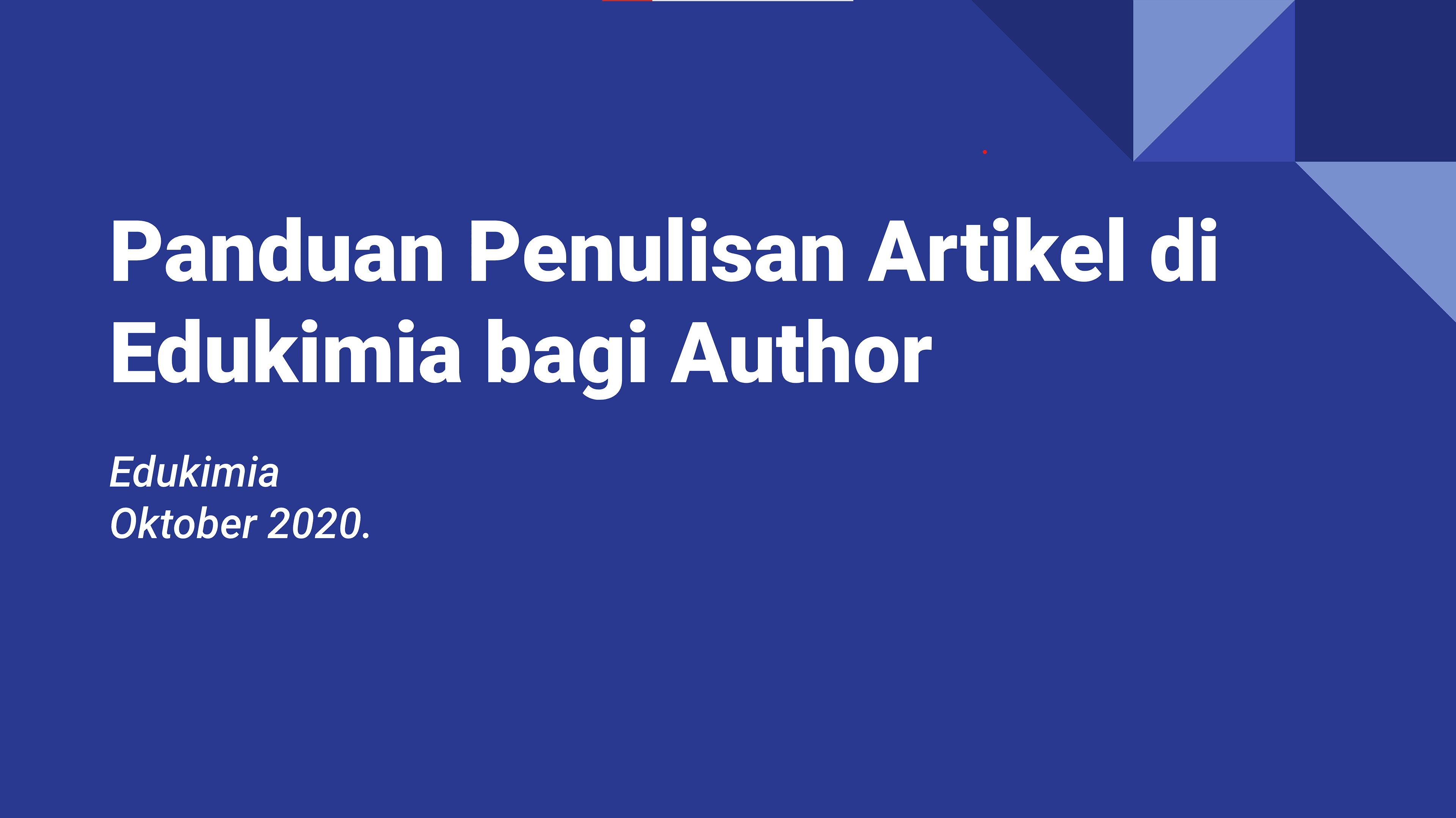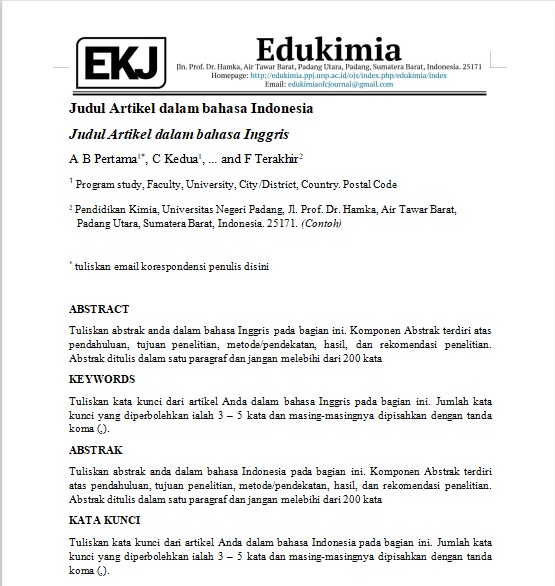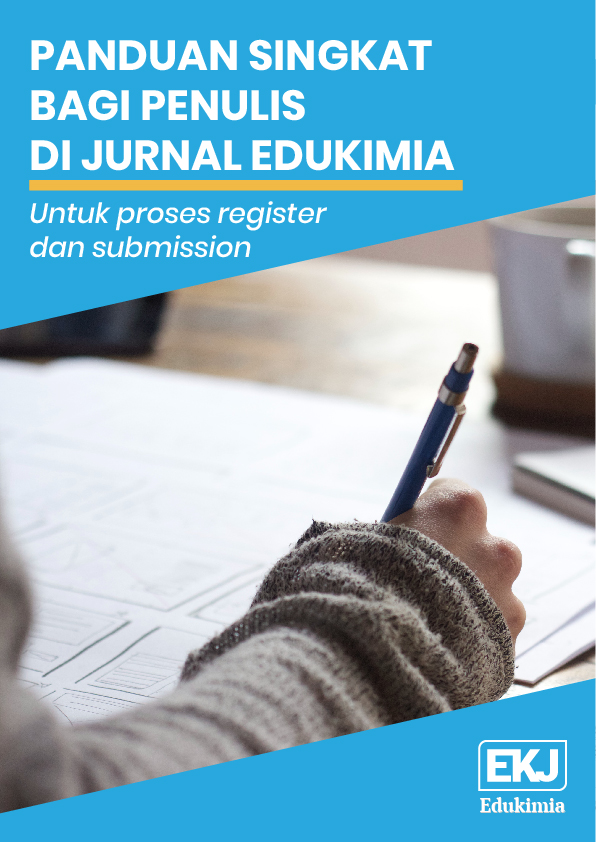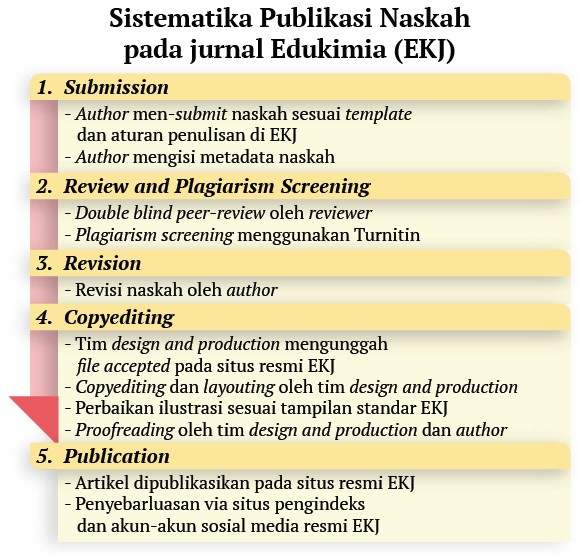Description of Communication and Collaboration Skills of High School Students in Acid-Basic Titration Learning with Guided Inquiry and Problem-Based Model
Article Metrics
The abstract has been viewed for 545 times.The full pdf article has been downloaded for 302 times.
Abstract
Keywords
Full Text:
EKJ 3 (1) - 2021 - Rizal (Bahasa Indonesia)References
Presiden Republik Indonesia. Penguatan Pendidikan Karakter. Indonesia; 2017.
Harjanti MH. The Implementation of the 21Th Century Competency for Elementary School Teachers At Curriculum 2013 Training Central Java Province Year 2017. Soc Humanit Educ Stud Conf Ser. 2018;1(1):523–31.
Zubaidah S. Keterampilan Abad Ke-21: Keterampilan yang Diajarkan Melalui Pembelajaran. J Penelit Pendidik. 2016;(2):1–15.
Indonesia PMP dan KR. Standar Proses Pendidikan Dasar dan Menengah. Indonesia; 2013.
Hanson DM. Designing Process-Oriented Guided-Inquiry Activities. 2005;281–4.
Arends RI. Learning to Teach. Ninth Edit. New York: Mc Graw Hill; 2012. 1–573 p.
Zed M. Metode Penelitian Kepustakaan. Jakarta: Yayasan Obor Indonesia; 2004. 1–3 p.
Sugiyono. Metode Penelitian Pendidikan Kombinasi (Mixed Methods). Bandung: Alfabeta; 2011.
RELX. 2018 RELX Group Annual Report. 2018.
Rafika AS, Putri HY, Widiarti FD. Analisis Mesin Pencarian Google Scholar Sebagai Sumber Baru Untuk Kutipan. 2017;3(2):193–205.
Snyder H. Literature Review as a Research Methodology : An Overview and Guidelines. J Bus Res. 2019;104(July):333–9.
Pedaste, M., Mäeots, M., Siiman, L. A., De Jong, T., Van Riesen, S. A., Kamp, E. T., ... and Tsourlidaki, E. (2015). Phases of inquiry-based learning: Definitions and the inquiry cycle. Educational research review, 14, 47-61.
Scanlon E, Anastopoulou S, Kerawalla L, Mulholland P. How Technology Resources Can Be Used to Represent Personal Inquiry And Support Students Understanding of It Across Contexts. J Comput Assist Learn. 2011;27:516–29.
Xue-song L, Qi-hui L, Jie C. Inquiry Learning Implementation and Evaluation in the Teaching of Information Technology. Phys Procedia. 2012;24:1851–6.
Hmelo-Silver CE. Problem-Based Learning: What and How Do Students Learn? Educ Psychol Rev. 2004;16(3):235–66.
Wood DF. ABC of Learning and Teaching in Medicine Problem Based Learning. Clin Rev. 2003;326:328–30.
Baharom S, Hamid R, Hamzah N. Development of a Problem Based Learning in Concrete Technology Laboratory Work. Procedia - Soc Behav Sci [Internet]. 2012;60:8–13.
Program GC. Oral Communication Rubric.
Rubric for Written Communication Skills.
Kofli NT, Rahman NA. The Open Ended Laboratory for Measurement of Communication Skill for Chemical or Biochemical Engineering Students. Procedia - Soc Behav Sci. 2011;18:65–70.
Iksan ZH, Zakaria E, Meerah TSM, Osman K, Lian DKC, Mahmud SND, et al. Communication Skills among University Students. Procedia - Soc Behav Sci. 2012;59:71–6.
Valente L. CO-LAB Guidelines for Assessing Collaborative Learning in the Classroom. European Schoolnet; 2016. 1–20 p.
Le H, Janssen J, Wubbels T. Collaborative Learning Practices: Teacher and Student Perceived Obstacles to Effective Student Collaboration. Cambridge J Educ. 2018;48(1):103–22.
Amalia NR, Rosanti W, Susatyo EB, Harjito. Analisis Keterampilan Dasar Laboratorium dengan Pembelajaran Pogil pada Materi Titrasi Asam Basa. Chem Educ. 2019;8(1):1–7.
Al-Faruq H. Keterampilan Proses Sains Siswa Kelas XI Pada Pembelajaran Titrasi Asam Basa Menggunakan Metode Problem Solving. Universitas Islam Negeri Syarif Hidayatullah; 2015.
Kementerian Pendidikan dan Kebudayaan. Silabus SMA K13 Revisi 2018.
Refbacks
- There are currently no refbacks.

.jpg)















